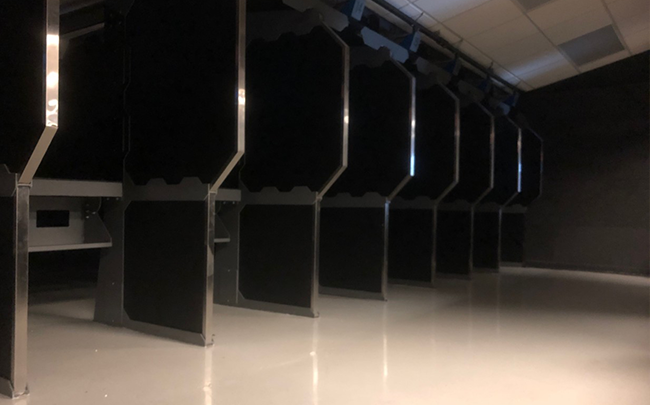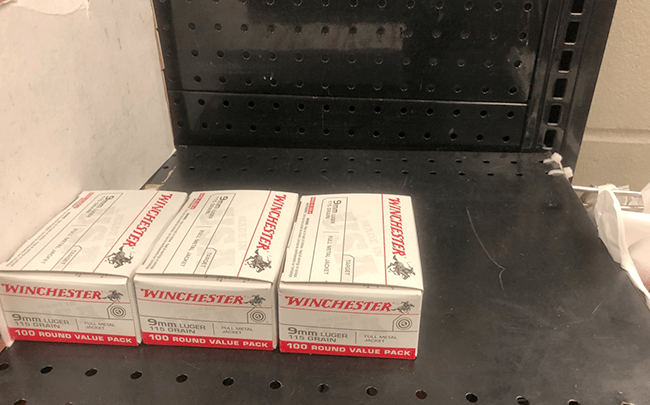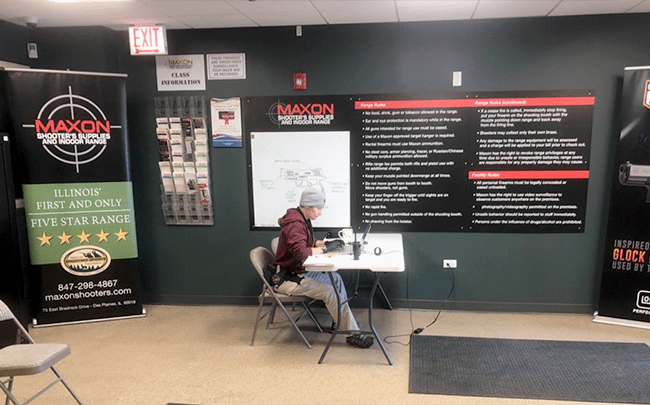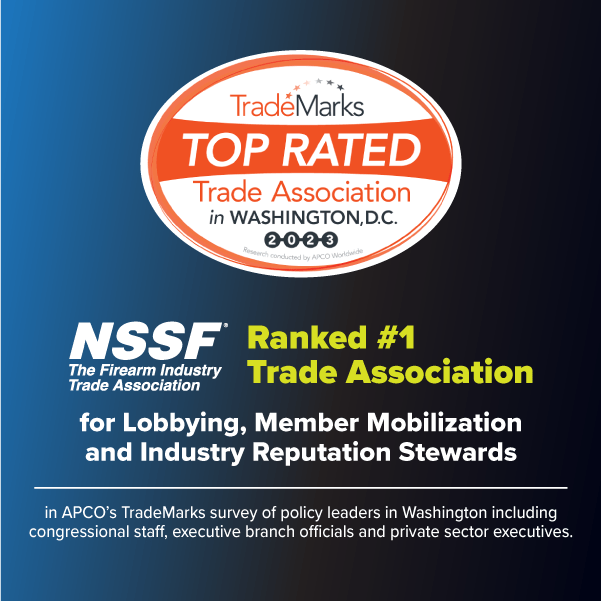 Back to News
Back to News
April 3, 2020
Dealing With Crisis: Maxon Shooter’s Supply and Indoor Range
Welcome to NSSF’s column for firearms range owners, managers and staff. As the coronavirus pandemic evolves, “Behind the Firing Line” will feature ranges working through the attendant social and legal challenges. It’s our intent to show how companies are responding during this crisis and demonstrating best industry practices to protect their staff and customers while still offering services when appropriate and allowed by law. This interview was conducted with Dan Eldridge, owner of Maxon Shooter’s Supply and Indoor Range in Des Plains, Illinois, on March 25, 2020.
The Escalation
For this facility, Friday the 13, 2020, was the day everything changed due to COVID-19. Within hours, traffic nearly tripled as this owner saw lines forming at counters—and demand for range time became nonexistent as people chose to stockpile ammunition rather than shooting it. “We went from significant traffic on the range to almost zero in one business day. At the counter, there was high demand for ball ammo, and pistols were selling exceptionally fast,” said Eldridge.

Unlike most other states, Illinois is dependent on the State Police to process NICS checks. The process takes significantly longer than a federal NICS, with FFLs using standing kiosks to complete the processes.
“The background check on a good day takes 15 minutes per customer,” explained Eldridge. “As expected, the process slowed dramatically that Friday. This created longer lines and a buildup of customers. It quickly became apparent for the safety of our employees and customers that we had to move customers outside of the front door and remind everyone to stay six feet apart. To add even more stress to the situation, it was raining.”
Shortly, Maxon staff stopped answering the phone, referring all customers to the website to make an appointment.
“We hated closing the phone lines down, but it was the only way we could effectively schedule people and start controlling the flow of customers in a safe manner. In Illinois, you are required to have a State FOID (Firearm Owner Identification Card) card, and if the customer didn’t have one, there was not much point in meeting with them—we can’t even sell them ammo without it,” he said.
The Website
One of the first changes this range made was to start making daily updates to its website. “People have a question, they go right to or our website. It became clear that information like changing hours, ammunition availability, event and class cancellations and other timely data helps relieve frustration and provides a calming tone. Another key has been listing the store’s complete inventory on the site. This allows the customers to know what’s available and what can be purchased without relative delay,” he said.
Staying Open
While the State of Illinois has some of the most restrictive firearm laws in the country, Democratic Governor Pritzker designated gun and ammunition suppliers as “essential” in his shelter-in-place order announced on March 20, 2020, as the state took additional steps to control the spread of Covid-19. Eldridge said there were many calls to government agencies in support of this. “This was a perfect example of the importance of having open lines of communication with our state representatives, the state police and the governor’s office. It was a relief to have them make a decision to keep the firearms retailers open. It became clear that staying open was the safest way to keep firearms secure with the procedures the State of Illinois had legislated,” he said.
Protecting the Staff
It’s a different day when a retailer finds lines at their counters and the government has mandated “social distancing.” The onslaught of customers completely reset procedures for customers in Maxon’s store.
“The first thing we realized was that, to keep our employees safe, we had to move the lines outside the store. For us, that wasn’t just an issue of social distancing. We are mandated by law to maintain complete control of our inventory and our safety. The store is now completely sanitized twice a day,” he said.
What’s Next
While the crystal ball may be cloudy, Eldridge feels that firearms will remain available at his range, though with slightly less selection. He sees ball ammo as being where the real challenge lies. He also said that his store had not raised prices, but if that happens, it will be a reflection of changes with distributors.

“We will not gouge our customers. In fact, in the recent week, there hasn’t even been time to change prices. However, ball ammo will be the toilet paper of the firearm retailer’s world. It moves slowly through the transportation system and will most likely be in short supply, with rising prices. When the range business starts to normalize, I think customers will be shooting more expensive ammunition until the supply returns. Other challenges will be firearm safes, though they still are shipping, and then there are some firearm manufactures that have been temporarily shuttered,” he said.
Where this range owner felt the reset button will be the most significant could be with members of the public who, for the first time, don’t feel protected by the system. “The entire Chicago area is watching law enforcement choosing who and what circumstances are within their purview. People are frightened when they see toll booth running [cars passing through without paying] and excessive speeding unenforced. Jails are letting inmates out and many basic civil laws are also going unenforced. Much of the public feels vulnerable right now.
“We are committed to training and embracing new shooters and will do so as soon as the legal system allows,” Eldridge added, referring to the many people wanting to do business with his store and range as first-time gun owners. “We’ve had to cancel several spring and summer NSSF +ONESM promotions, but we’ll get them moving again as soon as possible. Those programs will be more important than ever as we bring these new customers into our sport.”
The New Normal
Moving into the last week of March, visiting Maxon’s is allowed by appointment only made on the company’s website. The range itself is closed until further notice. Eldridge said that they needed this approach to lower the stress on employees and work to create a calming sense of control in the store. On average, it’s taking a couple of days to complete background checks. “We have also stopped accepting any new purchase transfers, and we don’t see that changing for a significant amount of time,” he commented.

Customers with appointments have it politely explained that the store can offer them 15 minutes of counter time and that the on-hand inventory is their primary focus; for the moment, Maxon’s has suspended special orders, along with transfers. As the coronavirus situation moves forward, Eldridge said that they are learning and adapting daily to the changing social climate, and while he would have never wished these circumstances on his family, employees or his fellow Illinois residents, he feels proud of his staff’s commitment to serve their community.
NSSF is proud of them too.
About Maxon Shooter’s Supply and Indoor Range
This range and retailer is 10 minutes from O’Hare Airport, just off of Interstate 90 in the northwest suburbs, only three miles from the Chicago City limits. Opened in 1955 as a small retail store, today the facility encompasses more than 16,000 square feet. The 4,000-square-foot retail store carries an inventory seasonally fluctuating from 900 to 2,000 firearms and a revolving stock of approximately 90 rentals. There are 20 75-foot lanes divided into two 10-lane bays. Maxon employs a staff of 28 full- and part-time employees and operates seven days a week most of the year.
It is one of only six FFL retailers within the Chicago metropolitan area of more than nine million residents.
You may also be interested in:
https://www.nssf.org/razorback-armory-how-to-handle-the-influx-of-new-customers-during-crisis/
Categories: BP Item, COVID, Education, Featured, Ranges, Retailers, Top Stories









